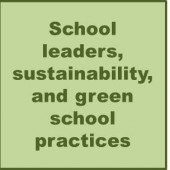As schools provide students with choice, support the development of critical thinking skills and promote project-based learning, incorporating a focus on sustainability is a natural progression of the learning process. In 2012, the US Department of Education (DoE) developed a federal outreach initiative entitled Green Ribbon Schools (GRS) that promotes sustainability, healthy living, and collaborative efforts. The catalyst behind this initiative was a group of non-profit organizations, including the Center for Green Schools at the U.S. Green Building Council (USGBC). This research focuses on case studies of K-6 schools that have been awarded the Green Ribbon School designation and how these schools build a foundation for adopting and continuing sustainable principles. Specific K-6 schools were identified and teachers and administrators from those schools were interviewed as to how they incorporated the three pillars of green ribbon schools (reducing environmental impact, improving health and wellness and offering effective environmental and sustainability education) into their existing curriculum and physical structure. Nine thematic categories were found to be the driving factors that supported the GRS success in their sustainable policies. The themes from this research help to articulate the conditions needed to create and advance sustainability initiatives.
Continue Reading
Many K-12 school districts are embracing energy conservation efforts and constructing environmentally sustainable buildings with the purpose of lower operating costs of their facilities. Investments in green infrastructure to improve operating efficiencies and occupant health are important but the impact on green buildings on instructional practice should also be considered. This study focused on teachers’ perceptions of the many impacts of a new sustainably designed middle school on students and teachers and explores the use of the school as a learning laboratory. Grades 6-8 teachers participated in open-ended focus group discussions near the end of the first school year in their new green building. An emergent coding framework was created to characterize conversation topics. Analysis of the coding yielded insights into seven major categories of teachers’ perceptions of the impact of the new green school on their work in the building and their students’ attitudes and academic performance. The seven major coding categories of green infrastructure, student behavior, student awareness, teacher awareness, curriculum, health, and professional development were further analyzed to formulate considerations and recommendations for others to capitalize on the instructional potential of sustainably designed school facilities as learning laboratories.
Continue ReadingUndergraduate education majors were enrolled in a project based learning methods course in spring 2012. As a culmination, they prepared five year plans to promote environmental stewardship in primary public schools in Bahrain. Since all students plan to eventually teach science in the primary schools, it is hoped they will be able to implement at least some of their plan and foster environmentally friendly habits that last for the lifetime of their students.
Continue Reading
Little research in educational leadership has addressed school leaders, sustainability, and green school practices. State policies requiring green building and management practices are rapidly becoming more common. However, we know little about school leaders’ attitudes, subjective norms, and perceived behavioral control beliefs relative to green school practices. This study begins a line of research investigating the behavioral intentions of school leaders to engage in green school practices. We report on an elicitation study including a diverse sample of 71 U.S. K-12 school leaders’ responses to open-ended survey questions designed following Ajzen’s Theory of Planned Behavior. In general, the study suggests that participating school leaders believe there are benefits to going green and most stakeholders will support greening efforts. However, limited resources (money, time, information, and personnel) present substantial barriers to leading and managing greener schools.
Continue Reading